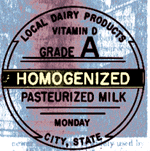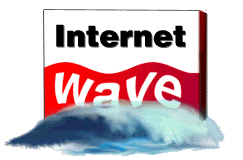
by Sarah Ellerman
In high school, the cafeteria lady used to tell me, "Thereís no such thing as a free lunch." I believed her, of
course. She was tall, and alarmingly prone to shouting.
I used to sidle up to the head of the line, fishing deep for the crumpled dollar bills in my pocket. "I have it right here," I'd sigh, "I swear." And Iíd be praying like hell that I had enough cash to pay for my half- congealed meatloaf and aggressively dyed fruit cocktail.
One day I miscalculated. It was the cheese fries that put me over the top. I couldn't put 'em back-- there was already a little smear of orange at the corner of my mouth, and in the reflection that bounced off the chrome dessert racks, I saw a guilty look on my face. I took a deep breath and blurted it out. "I'm sorry, but I only have a dollar. Could I pay the other sixty-five cents tomorrow?"
 A surprisingly soft look crossed the lunch ladyís face. "Oh, go on," she said, waving a plastic-gloved hand.
"Donít worry about it. You seem like a nice girl. And we have lots of food here."
A surprisingly soft look crossed the lunch ladyís face. "Oh, go on," she said, waving a plastic-gloved hand.
"Donít worry about it. You seem like a nice girl. And we have lots of food here."
These days, those cheese fries, friends, travel under the aliases Netscape Navigator, RealAudio, CU- SeeMe, and a host of other scrumptious killer apps. Theyíre the 'net equivalent of a free lunch. And sometimes, we aren't sure exactly why we're getting it. Will we be billed on our Visa later? Do we have to buy one more album at regular Club prices within a year? Are these cheese fries laced with strychnine? We look around warily and pick at the offering, filled with fear that it may have a profoundly bitter aftertaste.
IU decided to examine the give-it-away-now philosophy of modern economics on the 'net. Why are reputable companies offering their flagship products for free on the 'net? What did we do to deserve all this software for no more commitment than an anonymous mouseclick? In what subtle ways do we pay? And does anybody profit?
![]() Netscape
Netscape
The Salisbury Steak of your meal.
Netscape Navigator is the original free lunch. Newbies wonít remember, but in the olden days there wasnít a Netscape at all. You would just head on over to Mosaic to get beta versions of the latest thing, (gasp) a graphical Web browser. There were none of those fancy tricks... no colored backgrounds, no centered text, and no infernal at all. Mosaic was a product of the National Center for Supercomputing Applications at the University of Illinois at Urbana-Champaign, and it was only natural that Mosaic would be given away. After all, if it didnít get in the peopleís hands, how would the Web as we know it ever get built?
It's fairly easy to deduce Netscape's motivations in giving away test versions of their software. Netscape is currently the industry leader in browser innovations, and they have cultivated an amazing amount of grass- roots support from the citizens of the 'net. It seems that everywhere you go, you see some version of this: "This page enhanced for Netscape 2.0. If youíre not using Netscape, you should be! Link here and get a copy of the world's greatest browser." It smacks of multilevel marketing, but without the pressure and without the scam. People LOVE evangelizing Netscape. They LOVE the feeling of being part of a club of people who use what they feel is the best browser around. Netscape has spread a lot of good will with their high-quality giveaways.
Navigator is available on the shelf for $39.99. With that, you get upgrades, support and various other goodies, along with the pride of not being a freeloader. But we at IU find ourselves wondering about Navigatorís success on the shelves; the lure of trying out the software for 60 days as a non-commercial user is pretty sweet. Often, before the 60 days is up, thereís a new version released anyway. Many theorize that the company will never really make money on the browser, but that theyíll sell server software for a while, and maybe, just maybe someday their powerful name will be enough to get people behind them for their NEXT BIG THING.
What will it be? Nobody knows. But we feel sure that the legions of Netscape disciples will be pushing their way to the front of the lunchline.
 RealAudio
RealAudio
Want some green beans with that?
RealAudio is one of the contestants in the live-streaming audio marketplace, the ultimate in immediate gratification. RealAudio eliminates the tedium of downloading, and blasts you with audio from the moment you click. Users can download both the player software and encoder software for free; the server software, however, ranges in price between $2,490 and $13,490. There are lots of places willing to pay to serve up RealAudio sounds, though, from virtual jukeboxes to multimedia e-zines.
Frank Vaughan, Public Relations Director for Progressive Networks, the makers of RealAudio, says, "We sell one piece of the solution, and we create demand. Itís what you call a client-server model; we give away the client, and sell the server... With more than 3 million players out there, and currently about 1000 player downloads an hour, we ensure to those who are buying the server software that there is a customer base out there. This adds value for the customer." According to Vaughan, RealAudioís route of electronic- only distribution actually saves money. "There are a lot of costs associated with retail, such as shrink-wrap, cardboard boxes, the profit to the retailer and such... Instead of putting our energy into designing fancy packaging, we invest our intelligence into our products."
Vaughan relates the story of a high-profile West-coast furniture salesman whose gimmick is to give away something free with every purchase. "His motto was, 'Free is a very good price,' and you know, you canít argue with that. You canít find a better price than free... and we donít give away some crippled shareware product that has impaired functions, that you canít use to save. We let you download the real deal for free, and youíre not beholden at all."
 IWave
IWave
The mashed potatoes on your lunch tray.
IWave, a competitor of RealAudio, is marketed under a different strategy. When you visit IWaveís page, youíll notice that there is no mention of ordering or cost anywhere. Thatís because the whole deal is completely free. Completely free, you ask? Theyíre not trying to hook me and make me pay later? Wow. Whatís the catch?
"Thereís no catch," Lior Haramaty, VP of Technical Marketing for Vocaltec, makers of IWave and IPhone, says. Every element of the product -- the player, the encoder and the server software -- is given away free, and Haramaty says that Vocaltec has no plans to ever charge for IWave. Is Vocaltec is giving out IWave to spread good will among the Internet community? Haramaty laughs and responds, "Well, weíre not giving it away because weíre philanthropic, thatís for sure." He points out that the companyís flagship product, IPhone, sells for $99, and confirms that IPhone is the companyís primary focus, and that IWave, an ancillary product, is a strategy to help the company become more robust and garner more users. And thatís just a fancy way of announcing, "Ladies and gentlemen, lunch is served."
 CU-SeeMe
CU-SeeMe
Remember those little white dinner rolls?
Youíve seen it in Internet cafés, in long-distance relationships and in ads for futuristic voyeurism. Itís the software that adds the final element, and the human touch, to telecommunications -- sight. CU-SeeMe is free multi-user desktop videoteleconferencing software that works with Macintosh and Windows machines on affordable equipment. Hallelujah!
"When development of CU-SeeMe began in 1992, the only real-time videoconferencing software for the Internet required expensive hardware which severely limited the number of potential senders and receivers. The philosophy of the Cornell project was to start immediately with available, affordable hardware and deploy it as rapidly as possible. The goal was to stimulate creative thinking and create a wide base of user experience. By opening Internet videoconferences to Macintosh users, the CU-SeeMe team hoped to accelerate the adoption and usefulness of desktop conferencing, including live video," explains the Web site.
CU-SeeMe was developed with the funding and expertise of various individuals as well as National Science Foundation and Cornell University Medical Colleges. Development will continue on this important project, and there are no plans to charge for the software. So the next time you reunite a bunch of your wired friends from all across the country in a group sight-and-sound get-together, thank the powers that be, and our tax dollars, too, for deciding that this is a worthwhile goal.
The World Transformation Pages
Mmmmm. The unexpected ice cream bar.
The World Transformation Pages offer a different kind of free resource. The page says, "The overall theme here is to make the world a better place, to see things in a positive light, to stand up for one's rights, to pursue self-improvement and greater freedom, to have fun and to learn new things about life, the universe and everything." There is loads of useful information here on Utopias, nature, ecosystems, kindness, spiritual evolution, social innovation, the individualís role in society and more. Flemming Funch, creator and curator of the pages, provides this library free because of his personal philosophies, outlined in his essay "Free Resources."
When asked about the trend of companies giving product away, Funch comments, "I think thereís going to be more of that. If nothing else, itís going to be driven by the fact that people want something for free, so that companies will more and more have to do it, even if at the beginning they donít do it out of the goodness of their hearts, but because they want to make more money. It will force them into a different way of dealing with people."
He continues, "But for me, itís more that I would like everything to be free. A way of starting that is to take a little at a time, what one can give away, where itís really not a big issue if you get paid for it or not, and then the ratio can increase... Also, one thing that is going on is what Buckminster Fuller (a futurist/philosopher) called Ďephermeralization,í which is being able to do more with less. With the Web, and so forth, you can get so much of an effect with very little resources and money. And thatís sort of a trend that we, as a society, can produce more and more effects and communication and products with less and less work and less resources needed to produce it. That can allow more things to be freely available... It really doesnít cost much. I mean, some electrons have to be moved over, but itís not like you have to print it out, kill some trees and send out a big package."
Funch maintains that people should try to get the ball rolling by offering their resources to the community and beginning to share. He sees the Internet as a useful forum for people and companies to share their resources and make the world a better place.
So you see, there are many different motivations for companies to share their resources. From philanthropy
to ruthless strategy, something-for-nothing is becoming the modus operandi of the Web. IU is here to tell
you to relax and go with the flow. Nobodyís gonna hurt you. Download whatever looks good. If you want
to thank your benefactors, drop them an e-mail, or purchase one of their retail products. It's the right thing
to do.
You know, the ínetís a veritable buffet of free foodstuffs. Strap on the feed bag and check out these links:
alt.consumers.free-stuff Newsgroup on the topic of obtaining free stuff, from promotional freebies to coupons to software. Share your tips here.
Freeloader is a totally free off-line Web browser, working to download your favorite sites during off-peak times or when youíre not home, then presenting them to you off-line for instantaneous loading. Sponsored by advertisers and free to the 'net community.
FreeTel Free digital telephony over the Internet. Never pay a long-distance bill again. Advertiser-sponsored.
 Java In their own words: "Java™ is a simple, object-oriented, distributed,
interpreted, robust, secure, architecture-neutral, portable, high-performance, multithreaded, dynamic,
buzzword-compliant, general-purpose programming language." It does cool animation tricks, too.
Java In their own words: "Java™ is a simple, object-oriented, distributed,
interpreted, robust, secure, architecture-neutral, portable, high-performance, multithreaded, dynamic,
buzzword-compliant, general-purpose programming language." It does cool animation tricks, too.
![]() Jumbo In their own words: "Shareware! Games! Freeware! FREE! FREE!
FREE! The Biggest, Most Mind-Boggling, Most Eye-Popping, Most Death-Defying Conglomeration of
Freeware and Shareware Programs on the Known Web!" Tens of thousands of programs.
Jumbo In their own words: "Shareware! Games! Freeware! FREE! FREE!
FREE! The Biggest, Most Mind-Boggling, Most Eye-Popping, Most Death-Defying Conglomeration of
Freeware and Shareware Programs on the Known Web!" Tens of thousands of programs.
Phrantic Colonizing the Web and sharing the wealth by offering free home pages.
![]() Shockwave In their own words: "Shock
millions of Web users with interactive advertising, promotions, entertainment, and compelling user
environments. Transform Web pages into dynamic, interactive multimedia productions that load as quickly
as static images."
Shockwave In their own words: "Shock
millions of Web users with interactive advertising, promotions, entertainment, and compelling user
environments. Transform Web pages into dynamic, interactive multimedia productions that load as quickly
as static images."
VRML The Virtual Reality Markup Language lets you move through a 3-D simulation over the Web.
Bon appetit!

